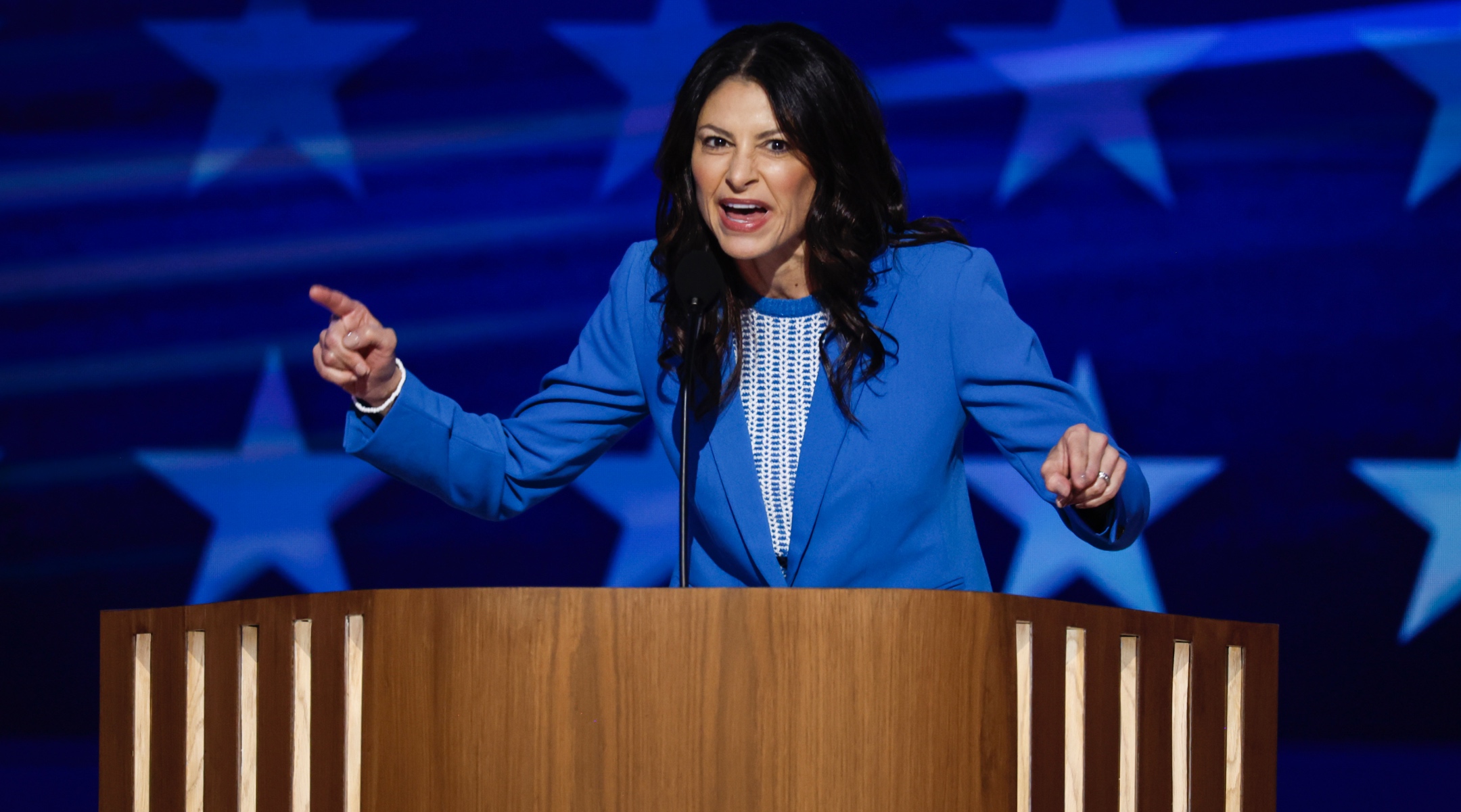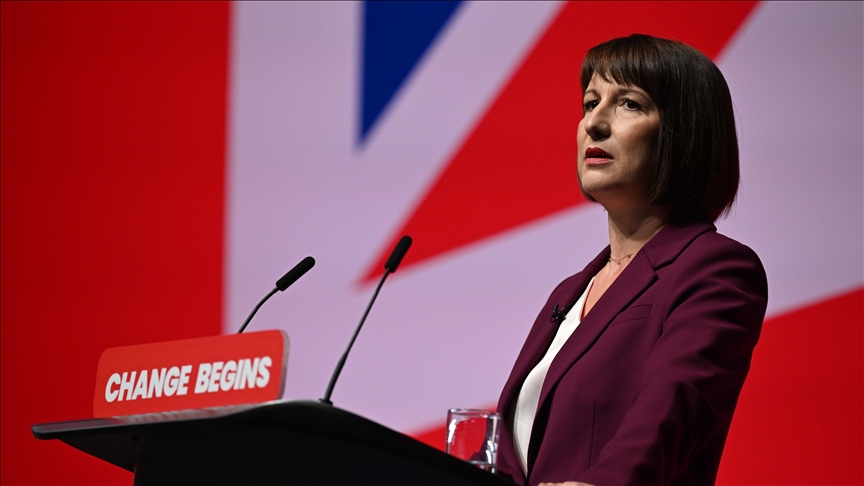Rashida Tlaib Hit With Wild New Smear
Edith Olmsted
Mon, September 23, 2024

Representative Rashida Tlaib, the only Palestinian American member of Congress, was attacked Monday for supposedly claiming that Michigan’s attorney general is going after pro-Palestinian protesters solely because she’s Jewish. The only problem is, Tlaib never said anything of the sort.
Jonathan Greenblatt, the CEO of the Anti-Defamation League, posted on X Monday addressing Michigan Governor Gretchen Whitmer while alleging that Tlaib had made an antisemitic statement about Attorney General Dana Nessel. Nessel is pursuing charges against pro-Palestinian protesters at the University of Michigan, alleging some had assaulted police officers and engaged in ethnic intimidation.
Greenblatt wrote, “When your attorney general prosecutes people for violating the law, harassing Jews, and attacking police officers, it’s in the interest of public safety. When a congresswoman accuses the attorney general of prosecuting protestors simply because she’s Jewish, it’s bias.”
In his post, Greenblatt linked an article published by Jewish Insider Sunday, which discussed an interview of Whitmer earlier that day on CNN. Host Jake Tapper had asked Whitmer to respond to Tlaib’s so-called argument that Nessel was “only doing it because she’s Jewish.” It’s unclear what Tapper’s source was for such a claim.
Whitmer declined to respond, saying, “I’m not going to get in the middle of this argument that they’re having.”
The Jewish Insider article stated that Tlaib “has also claimed that Nessel is only charging the protesters because she’s Jewish.” As evidence, that article repeatedly linked to yet another article, this one from the Detroit MetroTimes—which included no quote from Tlaib referring to Nessel’s Jewishness at all.
Nessel’s religious background was only mentioned as part of the description from the article’s author, who wrote, “Tlaib also criticized Nessel, who is the first Jewish person elected Attorney General of Michigan, for what she believes is a biased approach to the protest.”
A closer look reveals that Tlaib’s statement was not about Nessel being Jewish but about systemic anti-Palestinian bigotry.
“We’ve had the right to dissent, the right to protest,” Tlaib said, according to the MetroTimes. “We’ve done it for climate, the immigrant rights movement, for Black lives, and even around issues of injustice among water shutoffs. But it seems that the attorney general decided if the issue was Palestine, she was going to treat it differently, and that alone speaks volumes about possible biases within the agency she runs.”
It should surprise no one that Greenblatt is attempting to blur the lines here. The ADL has reportedly held that all pro-Palestinian demonstrating is equivalent to antisemitism, even though it is often carried out by Jewish protesters and usually serves as a condemnation of the policy decisions of Israel, rather than the personhood of its Jewish citizens.
Accused of fanning anti-Islam sentiment, the “National Review” drawing also drew attention to the alleged pro-terrorist actions of radical Democrats.
By Israel Today Staff | Sep 23, 2024

A cartoon tying anti-Israel Rep. Rashida Tlaib (D-Mich.) to Hezbollah sparked anti-Muslim-bias allegations by her and her supporters, as well as pushback by critics who noted her sympathy for Islamist terrorism.
It will “incite more hate and violence against Arab and Muslim communities,” Tlaib wrote on X about the cartoon, which National Review published on Friday.
Created by Henry Payne, the cartoon shows Tlaib at a desk with a smoking pager and the caption: “Odd, my pager just exploded.”
On Sept. 17, thousands of pagers used by Hezbollah operatives exploded in Lebanon and Syria, killing at least a dozen and wounding thousands more in what Iranian terror proxy said was an Israeli attack. The following day, additional Hezbollah devices exploded.
The controversy around the cartoon highlighted allegations of racism by advocates of Tlaib and other far-left Democrats. It also underlined conservatives’ criticism of the slide by some Democrats towards anti-Israel vitriol and acceptance of jihadist terrorism.
Tlaib, a Palestinian American, has a history of appearing alongside terrorists at events. In 2019, she posed with Abbas Hamideh, a Hezbollah apologist and activist for Israel’s destruction, at her swearing-in ceremony in Detroit. In May of this year, she spoke at the People’s Conference for Palestine event in Detroit that also featured Popular Front for the Liberation of Palestine (PFLP) member Wisam Rafeedie.
Like Hamas and other Palestinian terrorist groups, Tlaib is on record as opposing a two-state solution in favor of the maximalist one-state model, which is shorthand for the dismantling of Jewish self-governance. She has denied Israel’s right to exist and has used the “From the River to the Sea, Palestine will be free” slogan, which is widely understood to be a call to ethnically cleanse the Land of Israel of Jews.
Congress voted last November to censure the congresswoman for “calling for the destruction of the State of Israel” in connection with her use of that slogan.
Several Tlaib advocates joined her in condemning the cartoon, including Rep. Alexandria Ocasio-Cortez (D-N.Y.), who wrote on X: “The way Islamophobia and anti-Arab hatred is so deeply normalized and accepted in our politics is horrifying.”
Abdullah H. Hammoud, the mayor of Dearborn, Michigan, which has a sizeable Muslim community, wrote on X: “Absolutely disgusting. Anti-Arab bigotry & Islamophobia have become normalized in our media.”
Marina Medvin, a well-known conservative columnist and jurist, noted that the Dearborn-based Islamic Center of America on Friday hosted a vigil for the Hezbollah terrorists who were targeted on Sept. 17.
“You won’t believe this — or maybe you will: Rashida Tlaib’s Dearborn Michigan crowd is hosting a vigil for Hezbollah pager patrons,” Medvin wrote on X, attaching a banner advertising the event.
Brianna Wu, the executive director of Rebellion PAC, a progressive organization, on Sept. 19 aired her disappointment with Tlaib and Ocasio-Cortez over their stance on anti-Israel terrorism.
“I am extremely frustrated to see AOC, who I used to think was one of the best politicians in the entire country, whitewash Hezbollah. I used to deeply respect Rashida Tlaib, who I thought was one of the most pragmatic leaders in the progressive movement. She’s proven herself to just be a flat out antisemite,” Wu wrote on X, where she has 170,000 followers.
Payne, the cartoonist, told journalist Simon Shaykhet of the ABC-affiliated WXYZ Detroit station that his cartoon was part of a series of works that looks at Tlaib’s “lack of congressional leadership in failing to support Israel’s battle for survival,” as “Jews are under an existential threat from Iran and its Hamas-Hezbollah proxies not seen since WWII.”
National Review has so far resisted calls to remove the cartoon.
Updated: Henry Payne Responds to Outrage Over His Cartoon Showing Rep. Rashida Tlaib With Exploding Pager
 by
by 
The controversial cartoon.
Updated: 11:25 p.m., Saturday -- Detroit News columnist Henry Payne responds to sharp criticism about his cartoon in the National Review showing U.S. Rep. Rashida Tlaib with an exploding pager.
In an email to Deadline Detroit late Saturday night, Payne writes:
"Metro Detroit has an unfortunate history of intolerant leadership from Orville Hubbard to Rashida Tlaib. And cartoonists' pens have long lampooned their demagoguery."
------------------
From Earlier Saturday
Amidst the rising tension over the conflicts in the Middle East, a controversial cartoon by a Detroit News columnist is stirring anger.
The cartoon by Detroit News auto columnist Henry Payne, who has a side gig as a cartoonist, shows Michigan U.S. Rep. Rashida Tlaib sitting at her desk with an exploding pager and a bubbled caption: "Odd. My pager just exploded." The cartoon appeared in The National Review, a conservative publication.
The cartoon is an obvious reference to pagers assigned to members of the Lebanese organization, Hezbollah, that blew up this week in Lebanon and wounded thousands and killed dozens including children. Israel is believed to be behind the explosions, though it has not publicly confirmed that.
Many see the cartoon as a suggestion that Tlaib is a member of Hezbollah, a poltical and militant group and close Iran ally the U.S. classifies as a terrorist organization.
On X, Tlaib, who has been a sharp critic of Israel and its war in Gaza, blasted the cartoon:

Rep. Rashida Tlaib
"Our community is already in so much pain right now. This racism will incite more hate + violence against our Arab & Muslim communities, and it makes everyone less safe. It's disgraceful that the media continues to normalize this racism."
Dearborn Mayor Abdullah H. Hammoud posted on X:
"Absolutely disgusting. Anti-Arab bigotry & Islamophobia have become normalized in our media."
Democratic Vermont Congresswoman Becca Balint, a colleague of Tlaib, also wrote on X:
"Implying that a member of Congress is affiliated with a terrorist organization because she's Palestinian is downright racist, Islamophobic, and puts people in danger. The cartoon must be retracted with an apology to Rep. Tlaib and Muslim Americans."

Henry Payne (Detroit News photo)
Even Tlaib's critics felt it went too far.
Said Adolph Mongo, host of the podcast, "Detroit in Black and White:"
"I'm not a fan of hers. I think she's a phony when it comes to being perceived as a champion of Detroit and the Arab community. But the cartoon went too far. In this climate you've got enough nuts that would look at that and try to cause harm. Henry Payne should apologize, but he won't."
Edited by Ed Newman
2024-09-21

Washington, September 21 (RHC)-- Palestinian-American Congresswoman Rashida Tlaib has condemned as racist a cartoon that depicts her with a detonating pager, days after thousands of communication devices exploded across Lebanon in attacks blamed on Israel.
“Our community is already in so much pain right now. This racism will incite more hate + violence against our Arab & Muslim communities, and it makes everyone less safe,” Tlaib said of the cartoon published in conservative magazine National Review.
“It’s disgraceful that the media continues to normalize this racism,” the only Palestinian-American lawmaker in the United States Congress wrote on X on Friday.
Created by Henry Payne, the cartoon shows a woman sitting at a desk with a name card reading “Rep. Tlaib” where a device explodes. The woman remarks: “ODD. MY PAGER JUST EXPLODED.”
The illustration alludes to attacks in Lebanon on Tuesday and Wednesday when thousands of pagers and walkie-talkies exploded killing at least 37 people and wounding nearly 3,000, including civilians.
After the attacks, Tlaib shared a post by fellow Democratic Congresswoman Alexandria Ocasio-Cortez referring to it as a clear violation of “international humanitarian law”.
Tlaib, a Democrat from Michigan in the U.S. House of Representatives who is a vocal critic of Israel’s war on Gaza, has often weathered harsh vitriol from Republican and some Democratic opponents, including baseless accusations of sympathies with Hamas.
In November, Tlaib was formally censured by the House, a step just below expulsion, for allegedly “promoting false narratives” about the Gaza war and “seeking Israel’s destruction”, charges she rejects.
Tlaib said at the time she “will not be silenced and I will not let you distort my words.” Tlaib voiced her support on Thursday for Palestinians in the Gaza Strip, criticising her colleagues in the US Congress for their silence as US-funded weapons continue to fuel bloodshed in the besieged enclave.
“We are living through one of, again, the most documented horrific crimes against humanity in our history. These are children who did not live to see their first birthday. We cannot normalize this,” said Tlaib.
“My colleagues continue to be silent. I wonder if it’s because these babies are Palestinian? They’re children, that’s it,” she added.










